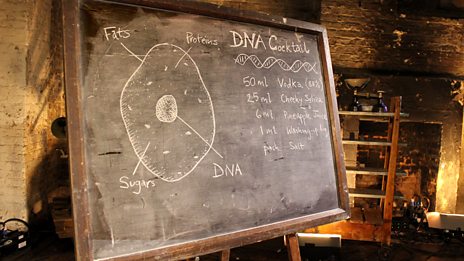Dara O'Briain was the host with four additional presenters. This episode was themed on the science of Genetics and started with a brief gentle introduction to how our understanding has grown from the Greek era to modern day. There was then a discussion of how genetic diversity has increased due to ability to travel wider to find mates (starting with the bicycle and moving on to air travel).
This was followed by a brief appreciation of that ground-breaking invention - the bike.
There then was an investigation of the audiences parental diversity with some interesting results.
Another experiment tried blending the audiences faces to get an 'average' face that according to one theory should be more attractive as it lacks asymmetry. This was dismissed at the end of the programme when the resulting images were displayed...
Next there was a consideration on the number of genes in different organisms and similarities between species. A simple test using Boar scent illustrated that certain people had a gene that enabled them to smell it (either nice or nasty) which was reminiscent of the IFR Taste & Flavour activity.
It was followed up by a critical evaluation of the Human Genome project and illustrated the difficulty in explaining to non-scientist politicians why an area of science should be publicly funded.
 Next the team extracted human DNA from cheek cells using washing up liquid (fat dispersant), pineapple juice (protease) and 88% proof Polish vodka (With due deference to our Polish PhD student, Dara demonstrated that DNA extraction was a better use for this than drinking it :-)).
Next the team extracted human DNA from cheek cells using washing up liquid (fat dispersant), pineapple juice (protease) and 88% proof Polish vodka (With due deference to our Polish PhD student, Dara demonstrated that DNA extraction was a better use for this than drinking it :-)).This was followed up by a report on how the sequencing of Neanderthal DNA illustrated that before they died out, there was some inter-breeding with homo sapiens.
The equivalent of the "Top Gear Cool wall" was displayed with pictures of scientists who have made significant contributions to genetics.
Another aspect of genetics was then explored - epi-genetics which illustrates that diet and lifestyle CAN affect expression of our genes. Results seemed to indicate that effects our diet & lifestyle could be passed on affecting even our grandchildren. Sadly, it stopped short of exploring our extended genome provided by the commensual bacteria in our gut (An area of interest to scientists at the Institute of Food Research).
To summarize, a very good and promising start at a very accessible general science programme.




No comments:
Post a Comment